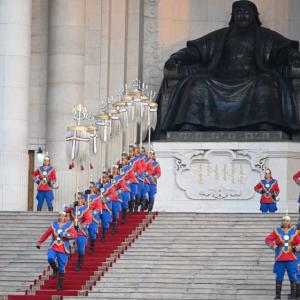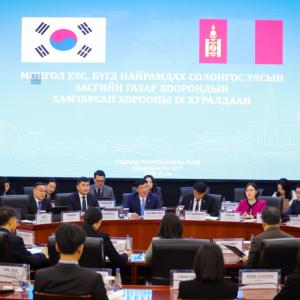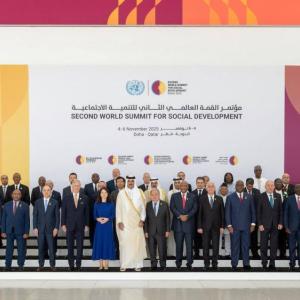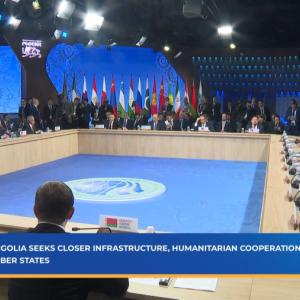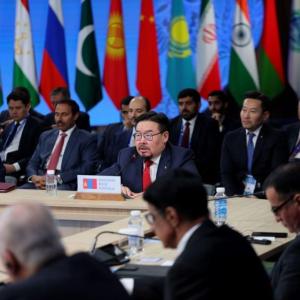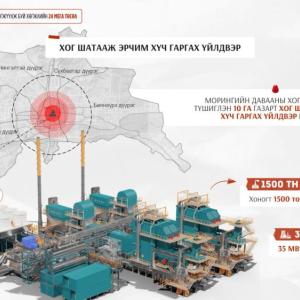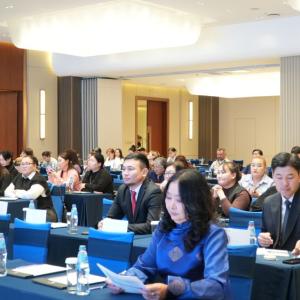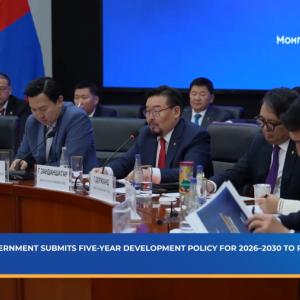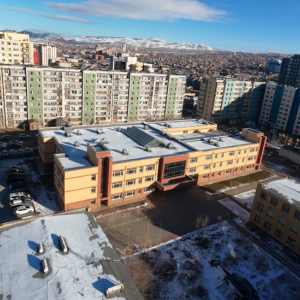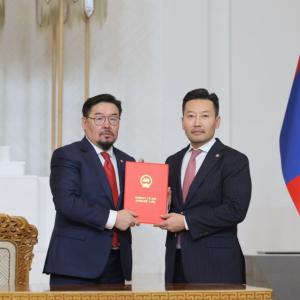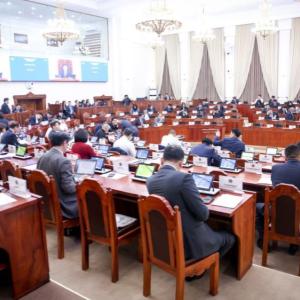“The first state budget to be implemented in a year of austerity”
Economy
Ulaanbaatar /MONTSAME/. Last
week, on November 11, the State Great Hural approved the 2023 State Budget of Mongolia. At a time when the whole world is trying to strengthen its economy by
switching to austerity mode, how Mongolia budgeted its budget is drawing
people's attention. The current budget is unique in that it was approved at a
time of uncertain risks, from the need to keep the inflation rate at a single digit in the next year to the impact of geopolitical and war issues.
Budget
revenue to be 19 trillion 49.6 billion
The budget for the upcoming
year will bring in MNT 19 trillion 49.6 billion in overall revenue, which is
equal to 34.9 percent of the country's GDP. The total balanced budget deficit
is anticipated to be MNT 1 trillion 425.7 billion, or 2.6 percent of the gross
domestic product, whereas the total expenditures are MNT 20 trillion 475.3
billion, or 37.6 percent of the GDP. The budget was developed for the first
time in accordance with the austerity law, officials emphasize. However, the
total revenue expected to be collected in 2023 is MNT 3.4 trillion, which is
more than 20 percent greater than the approved budget for 2022. The total
deficit of the budget has been reduced to MNT 1.4 trillion, by MNT 127.6
billion compared to the previous budget. The deficit, for instance, hit MNT 4.4
trillion in 2020, MNT 2.9 trillion in 2021, and MNT 2.4 trillion in 2022.
Inflation
rate to be kept at single-digit amount
Economic growth is projected
to be 5 percent in Mongolia's budget for the following year, while inflation is
projected to be 8 percent or a single-digit amount. However, according to
international organizations, Mongolia's inflation rate would be between 10.5
and 13 percent in 2023. For instance, the Asian Development Bank found that
Mongolia's inflation will still be high as a result of rising import prices
brought on by disruptions in the supply chain, rising transportation costs, and
the depreciation of the MNT relative to other currencies. According to the National
Statistics Office of Mongolia, the depreciation of the MNT, problems with
logistics and transportation, and excessive food inflation on the global market
have all contributed to the inflation rate reaching 13.8 percent as of right
now. The experts warn that projections may diverge due to the external
environment's uncertainties, changes in the inflation rates of trading
partners, and a decrease in the MNT currency rate.
Debt guarantee cap to be MNT 3.7 trillion
As of the halfway point of this
year, Mongolia owes USD 33.3 billion in foreign debt. If we break it down,
businesses have USD 21.3 billion, the government 8.1 billion, the central bank
2.5 billion, and the remaining USD 1.4 billion are issued to commercial banks.
The maximum amount of international and domestic loans that the government may
take in 2023 as part of funding the budget deficit is set at up to MNt 2.8
trillion. In particular, the government has been given permission to use up to MNT
1.2 trillion in foreign project loans. To put it another way, the government
has estimated that it will receive MNT 4 trillion in loans to pay its losses
next year. The maximum amount of the government's debt guarantee for the
upcoming year will be MNT 3.7 trillion.
Mining sector to contribute MNT 4.9 trillion to budget
According to forecasts, state budget spending will rise by 58 percent in 2023 compared to 2022. It is anticipated that the Oyu Tolgoi underground mine will be put into operation next year, which would result in an increase in copper exports for our nation, which is dependent on mining. Mongolia, therefore, intends to step up the recovery of the border ports, increase the export of mineral goods, and concentrate its efforts on enhancing tax payments in the upcoming year. For instance, it is estimated that mining, which currently bears the bulk of the economy's weight, will produce MNT 4.9 trillion in revenue next year, or approximately 25 percent of the total budget revenue.
According to estimates, royalties from mineral resources will bring in MNT 2.5 trillion, 238 billion from gold, 1.7 trillion from coal, and 2.3 trillion from copper concentrate. In doing so, it was anticipated that copper would cost USD 8400 per ton and coal would cost USD 200 per ton. In addition, the completion of the railway connection between Gashuunsukhait and Gantsmod border port will result in a rise in coal shipments to 36.5 million tons in the next year. Experts have cautioned that recent coal export predictions have been overly optimistic, which could cause a disruption in the state's revenue. International specialists point out that although the cost of mineral products has risen in recent years on the global market, there is a tendency for it to fall in the coming years.
No
new investments to be made
Although the government
declared that it has fully shifted to austerity mode, the state budget
expenditure was approved to be MNT 20 trillion 475.3 billion. Mongolia
specifically boosted its expenditure over the prior year by 2.5 trillion.
Mongolia will complete the construction projects begun in previous years and
won't make any additional investments in the coming year. MNT 2 trillion 695
billion will be used to finance investment projects, measures, and
constructions in the coming year while MNT 279.5 billion has been budgeted to
spend on projects, measures, and constructions implemented under the turnkey
contracts. For instance, 78 percent of the ongoing project will be completed in
2023, along with 86 schools, 62 medical facilities, 36 boarding homes, and 103
kindergartens. Public transportation fleet reforms will also be fully settled,
and particular attention will be paid to decreasing the traffic in the upcoming
year. In this context, the capital city will receive MNT 318 billion for the
public transportation fleet renovation.
Finance Ministry's budget reduced
by MNT 115.5
billion
One of the most important things that draw citizens’ attention is budget management. The funding that the Minister of Energy will use to finance the night electricity tariff has increased, as shown in the budget for the next year. Moreover, the budget of the Ministry of Energy and the Ministry of Environment and Tourism has grown by MNT 83.7 billion and MNT 11 billion, respectively, for the upcoming fiscal year. Additionally, MNT 18 billion more has been allocated to the Minister of Health's budget for the "Whole Liver-Mongolia" program's continuous implementation. On the other hand, the budget for the Minister of Finance has shrunk by MNT 115.5 billion, while the President's Office's expenses have declined by MNT 341 million.
Policy
support to be provided for decentralization
The budget policy's
implementation, which aims to balance urban and rural development, lessen
excessive concentration, ease traffic congestion, and foster entrepreneurship
and investment, will be closely watched the following year. For instance,
citizens and entities shifting their businesses from Ulaanbaatar, the capital
city, to the rural regions will be able to receive loans with a discounted
interest rate of 1 percent, and individuals moving from the capital city will
receive reduced mortgage loans of 3 percent.
In terms of the child allowance, it will be provided to 90 percent of all children of the households with a monthly income of less than MNT 3.5 million. Mongolia anticipates spending MNT 1.4 trillion on 1.1 million kids in 2023.
Thus, the budget was passed
by the State Great Hural during a challenging moment for the economy, as rising
inflation, a falling MNT exchange rate, and a decline in foreign exchange
reserves will make things difficult for Mongolia's economy in the year to come.
 Ulaanbaatar
Ulaanbaatar






